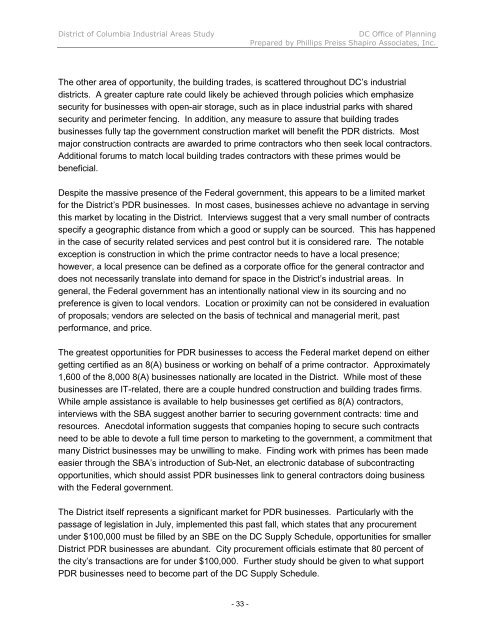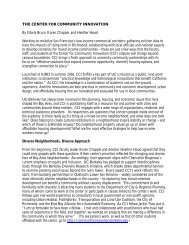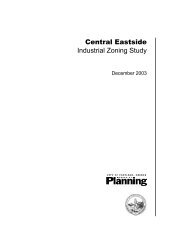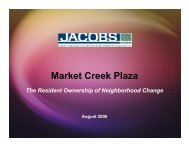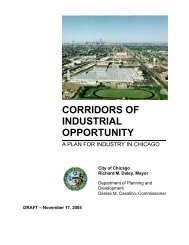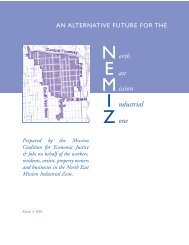INDUSTRIAL LAND IN A POST-INDUSTRIAL CITY District of ...
INDUSTRIAL LAND IN A POST-INDUSTRIAL CITY District of ...
INDUSTRIAL LAND IN A POST-INDUSTRIAL CITY District of ...
You also want an ePaper? Increase the reach of your titles
YUMPU automatically turns print PDFs into web optimized ePapers that Google loves.
<strong>District</strong> <strong>of</strong> Columbia Industrial Areas Study DC Office <strong>of</strong> Planning<br />
Prepared by Phillips Preiss Shapiro Associates, Inc.<br />
The other area <strong>of</strong> opportunity, the building trades, is scattered throughout DC’s industrial<br />
districts. A greater capture rate could likely be achieved through policies which emphasize<br />
security for businesses with open-air storage, such as in place industrial parks with shared<br />
security and perimeter fencing. In addition, any measure to assure that building trades<br />
businesses fully tap the government construction market will benefit the PDR districts. Most<br />
major construction contracts are awarded to prime contractors who then seek local contractors.<br />
Additional forums to match local building trades contractors with these primes would be<br />
beneficial.<br />
Despite the massive presence <strong>of</strong> the Federal government, this appears to be a limited market<br />
for the <strong>District</strong>’s PDR businesses. In most cases, businesses achieve no advantage in serving<br />
this market by locating in the <strong>District</strong>. Interviews suggest that a very small number <strong>of</strong> contracts<br />
specify a geographic distance from which a good or supply can be sourced. This has happened<br />
in the case <strong>of</strong> security related services and pest control but it is considered rare. The notable<br />
exception is construction in which the prime contractor needs to have a local presence;<br />
however, a local presence can be defined as a corporate <strong>of</strong>fice for the general contractor and<br />
does not necessarily translate into demand for space in the <strong>District</strong>’s industrial areas. In<br />
general, the Federal government has an intentionally national view in its sourcing and no<br />
preference is given to local vendors. Location or proximity can not be considered in evaluation<br />
<strong>of</strong> proposals; vendors are selected on the basis <strong>of</strong> technical and managerial merit, past<br />
performance, and price.<br />
The greatest opportunities for PDR businesses to access the Federal market depend on either<br />
getting certified as an 8(A) business or working on behalf <strong>of</strong> a prime contractor. Approximately<br />
1,600 <strong>of</strong> the 8,000 8(A) businesses nationally are located in the <strong>District</strong>. While most <strong>of</strong> these<br />
businesses are IT-related, there are a couple hundred construction and building trades firms.<br />
While ample assistance is available to help businesses get certified as 8(A) contractors,<br />
interviews with the SBA suggest another barrier to securing government contracts: time and<br />
resources. Anecdotal information suggests that companies hoping to secure such contracts<br />
need to be able to devote a full time person to marketing to the government, a commitment that<br />
many <strong>District</strong> businesses may be unwilling to make. Finding work with primes has been made<br />
easier through the SBA’s introduction <strong>of</strong> Sub-Net, an electronic database <strong>of</strong> subcontracting<br />
opportunities, which should assist PDR businesses link to general contractors doing business<br />
with the Federal government.<br />
The <strong>District</strong> itself represents a significant market for PDR businesses. Particularly with the<br />
passage <strong>of</strong> legislation in July, implemented this past fall, which states that any procurement<br />
under $100,000 must be filled by an SBE on the DC Supply Schedule, opportunities for smaller<br />
<strong>District</strong> PDR businesses are abundant. City procurement <strong>of</strong>ficials estimate that 80 percent <strong>of</strong><br />
the city’s transactions are for under $100,000. Further study should be given to what support<br />
PDR businesses need to become part <strong>of</strong> the DC Supply Schedule.<br />
- 33 -


